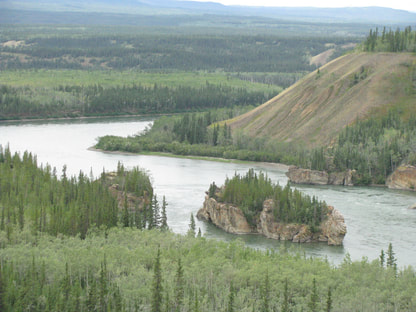Yukon River Inter-Tribal Watershed, Yukon

Year(s) Funded: 2012-2013, 2013-2014, 2014-2015
Topic Area: Water Quality Contact: Yukon River Inter-Tribal Watershed Council Partners: Yukon River Inter-Tribal Watershed Council, White River First Nation, Kluane First Nation, Tr'ondëk Hwëch'in First Nation, Selkirk First Nation, Carcross / Tagish First Nation Website: https://www.yritwc.org Title:
Action: Phase I: The primary objectives of this research were to document First Nation concerns regarding climate change, contaminants, and public health and to measure baseline levels of contaminants in these communities. Youth interns and community members were trained in water quality sampling techniques. The youth interns were certified under YRITWC water quality protocols, with two youth and four community members trained in YRITWC Active Layer Network monitoring protocols. Focus groups, interviews and a mapping exercise were conducted to identify sites of concern and record Indigenous Knowledge of the environment around these sites. Phase II: This research involved developing climate adaptation strategies based upon intergenerational Traditional Knowledge and western science technology and concepts. Workshops were held which involved a youth PhotoVoice activity and an intergenerational knowledge sharing luncheon. First Nations youth and/or government staff were trained in field methods for the health-related aquatic contaminant monitoring, the collection of surface water samples, permafrost monitoring and the collection of surface water samples. Youth were instructed on how to use a database called FieldSchope, topographical maps, global positioning systems, and geographic information systems. They were then shown how environmental observations (including field data, photos, and videos) could be uploaded to FieldScope and how community members throughout the Yukon River watershed can share their concerns and observations with the world. Phase III: First Nations leaders from across Yukon were brought together to recognize, prioritize, and address health concerns related to water and climate change at a regional level. Phase I and Phase II built the foundation for a water action workshop. Originally, the YRITWC collaborated with five Yukon First Nations to establish climate change adaption plans. Results: Phase I: 5 focus groups were completed and recorded using field notes and audio-visual. A mapping exercise was conducted and a total of 95 areas were identified as sites of concern. Overall, 49 individuals participated in the focus groups. 61 interviews were also conducted and with key informants and recorded using audio. Phase II: 25 sites were used for sample collections (metals, hydro-carbons, nutrients, and/or bacteria) which were then analyzed by a laboratory and compared to the Canadian Council of Ministers of the Environment’s “Water Quality Guidelines for the Protection of Aquatic Life”. The results were disseminated through presentations, community reports, and community calendars. Phase III: For the water action workshop, 14 First Nations were invited with 10 First Nations in attendance to formulate a region-wide water action plan. The project involved developing a two-day workshop in Whitehorse, Yukon for Yukon First Nations. A community report titled, “Water Action Planning Workshop Report”, was developed after the workshop. Outputs: A workshop report was developed from the water action workshop. |
